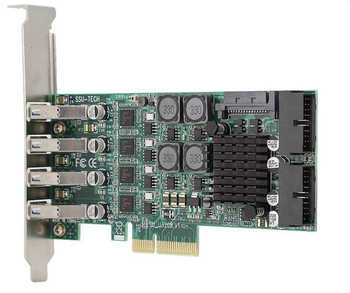Stephen used the PCIe slot to try out a couple of expansion cards he had to hand:
 The NIC has 4 ports and 4 MAC addresses. The NIC worked flawlessly and was recognized by the
system as 4 Pericom PCIe bridges and 4 Realtek NICs.
Being that the original NIC in the 78xxq is a Realtek thats a total of 5 Realtek NICs.
The NIC has 4 ports and 4 MAC addresses. The NIC worked flawlessly and was recognized by the
system as 4 Pericom PCIe bridges and 4 Realtek NICs.
Being that the original NIC in the 78xxq is a Realtek thats a total of 5 Realtek NICs.

 The card includes two 19pin sockets, each 19pin socket can be connected to two USB3.0 interfaces
so bringing the possible total up to 8 USB ports.
The card includes two 19pin sockets, each 19pin socket can be connected to two USB3.0 interfaces
so bringing the possible total up to 8 USB ports.
The first time he tried to boot with the USB3 card in place the power light came on but there was no post 'beep'. he took everything apart and put it back together. Then everything worked. Subsequently he was not able to duplicate the non-working state.
It is recognized as 5 ASMedia PCIe bridges and 4 Renesas USB controllers. This USB3 card is fairly powerful. It uses 4 PCIe lanes and is wired to deliver full USB3 capabilities (power and speed) to 4 ports. To be able to meet the power requirements[*] there is a separate SATA style power connector on the board, but, as you would expect, things will ultimately be constrained by the capabilities of what this is connected to. In this example that's the capability of the 78xxq's onboard 5V regulator and that of the external 12V supply.
One final note on the USB3 card, when installing it he had to remove an end post from the SATA cable in order to make it fit the on-board SATA socket. The supplied plug was designed for a stand-alone power socket, not for a 7+15 combined data and power socket.
* The USB3.0 standard supports a battery charging mode of operation and also Power Delivery mode. The latter may support power output from 0.5W to 100W per port. However higher powers require 12V, 15V or 20V supplies. SATA power sockets on thin clients generally only provide +5V as they are intended for SATA DOMs. With only +5V available the maximum power mode is 15W per port.
